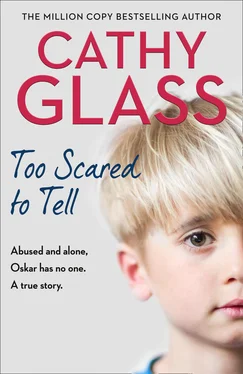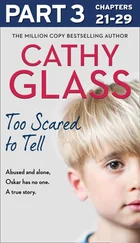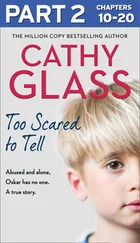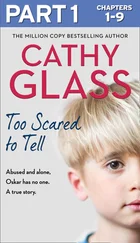‘Do you know those men?’ I asked Oskar again, turning in my seat to look at him.
‘No,’ he said, but I could tell from his expression that he did and also that he was worried, if not scared, by their presence.
‘You’re safe with me,’ I said, but before I started the engine I pressed the central locking system, so none of the doors could be opened from the outside. I wasn’t being paranoid; I had no idea who those men were, why they were taking such an interest in us or why Oskar should be frightened of them. Had he come from a large extended family, I might have thought they were part of his family and wanted to see where he was being taken. It had happened to me before, just as it’s happened to other carers: a child is placed, the carer’s address is purposely withheld and then a family member follows the foster carer home on the school run. However, as far as I knew at that point, Oskar only had his mother, and she wasn’t in the country. Perhaps they were some of Oskar’s ‘uncles’, but then why had he denied knowing them? I couldn’t begin to guess who they were.
As I pulled away the car remained where it was. Even so, I glanced in my rear-view mirror every so often just to check we weren’t being followed home. There was no sign of the car.
I talked to Oskar as I drove, telling him about my family and reassuring him there was nothing to worry about. He sat very quiet and still, mainly gazing out of his side window. It was impossible to know what he was thinking or feeling. From the few words he’d spoken, his English seemed to be very good – surprisingly good, considering he’d only been in the country a few months. We arrived home just before 5.00 p.m. and as I parked outside my house I asked him one more time: ‘Do you have any idea who those men were?’
‘No.’
So I let the matter drop. What I didn’t know at the time was that I was going to have to return to the subject very soon.
Chapter Two
Only my youngest daughter Paula, twenty-one, was at home when I arrived with Oskar. She was studying for a business degree at a local college and was often in ahead of my other two children – Adrian, twenty-five, and Lucy, twenty-three – who both worked. As soon as Paula heard my key in the front door, she was in the hall ready to greet us.
‘I got your text, Mum. Hi, Oskar,’ she said brightly. We had a family WhatsApp group so my children and I could message each other collectively. It had largely replaced leaving notes. I’d texted our group earlier to let them know Oskar was coming to stay with us. Having grown up with fostering, my family were used to children and young people suddenly arriving.
‘This is my daughter, Paula,’ I told Oskar as I helped him out of his coat. He looked at Paula with the same mixture of angst and bewilderment as he had when looking at me.
‘Nice to meet you, Oskar,’ Paula said, smiling at him.
‘He’s a little quiet at present,’ I told her when he didn’t respond.
‘That’s OK, he’ll get used to us.’ She threw him another reassuring smile.
At that point Sammy, our rescue cat, strutted into the hall to see who had invaded his territory. He’d been a bit feral when we’d first had him but could now be relied upon not to eat the children.
‘Your cat,’ Oskar said, staring at the cat.
‘Yes, he’s called Sammy,’ I said. ‘Would you like to stroke him?’
He was showing the same reluctance to greet Sammy as Sammy was to him. Paula picked up the cat and presented him to Oskar. He tentatively stroked him.
‘Sammy likes you,’ Paula said, and finally Oskar’s expression gave way to a tiny smile. I breathed a sigh of relief.
Oskar stroked Sammy a few more times and then our cat, a little short on patience, jumped from Paula’s arms and disappeared down the hall. Oskar looked after him but didn’t try to follow him as another child might.
‘Let’s take off your shoes,’ I said, undoing the Velcro. I helped him out of his shoes and left them with ours in the hall. His shoes, like his clothes, were in poor condition, as were those of many of the children I’d fostered.
Before I’d left home to collect Oskar from school, I’d set out some toy boxes in the living room ready for our return. I’d found that playing can often distract a child from their worries and help them to feel at home and start to relax.
‘Let’s go and find some toys,’ I said enthusiastically. ‘Would you like a snack first to see you through till dinner?’
He shook his head, so taking his hand we went into the living room. It’s at the back of the house with large glass patio doors that overlook the garden.
‘Would you like to play?’ Paula asked encouragingly, going over to the toy boxes.
Oskar looked at them and then at me. ‘Where do I have to sleep?’ he asked anxiously.
‘You have your own bedroom upstairs,’ I said. ‘It’s not bedtime yet, but would you like to see your room now?’
He nodded.
‘That’s fine,’ I said. ‘This way.’ It was slightly unusual for a child of his age to be more interested in their bedroom than toys. Teenagers can’t wait to chill out in their own rooms, but not so with younger children.
‘Shall I put dinner on?’ Paula asked. ‘I’m hungry.’
‘Yes, please. There’s a casserole in the fridge that just needs popping in the oven.’
While Paula went to the kitchen, I took Oskar upstairs. Children react differently to the stress of coming into care: some are very loud and display challenging behaviour, while others, like Oskar, are quiet and withdrawn. The latter is more worrying, as it suggests the child is internalizing their pain, rather than letting it out.
‘There’s nothing to worry about,’ I told him as we followed the landing round to his bedroom. He was holding my hand – in fact, gripping it quite tightly. ‘Do you have your own bedroom at home?’ I asked him as his gaze travelled warily around his room. He looked at me, confused. ‘Or do you share a bedroom?’ Information like this would usually have been available on the placement forms, had the move been planned in advance. It would have helped me build up a picture of Oskar’s home life before coming into care so I could better meet his needs; for example, if a child is used to sharing a bedroom with siblings, they might need a lot of reassurance on their first few nights of sleeping alone.
‘I sleep with Mummy,’ Oskar said.
‘OK.’ Although I wouldn’t have expected a child of Oskar’s age to be sleeping with a parent.
‘And Maria, Elana and Alina,’ he added.
‘Who are they?’ I asked, puzzled.
He shrugged.
‘Are they your sisters?’
He shook his head.
‘Cousins? Friends?’
He shrugged again and began to look very worried, so I didn’t pursue it. Perhaps he was just confused by all the changes, but I’d have to tell his social worker. He would be checking Oskar’s home and seeing the sleeping arrangements for himself before he returned Oskar to his mother’s care.
‘We’ve got a nice big garden,’ I said, drawing him to the window. His room was at the rear of the house and overlooked the garden. He was just tall enough to see over the windowsill. ‘You can play out there when the weather is nice, and we also have a park nearby.’
Oskar turned from the window to survey the room. ‘Do you like your bedroom?’ I asked. He didn’t reply. ‘Once we have some of your belongings from home in here it will feel more comfortable.’ Still no response. ‘Would you like to see the rest of the upstairs?’
He gave a small nod.
He slipped his hand into mine again and I showed him the toilet first, and at the same time asked him if he needed to use it, but he didn’t. ‘This is Adrian’s room,’ I said, moving to the next door along the landing. ‘He’s grown up now, but you’ll meet him later when he gets in from work.’ I opened Adrian’s bedroom door just so Oskar could see inside. ‘All our bedrooms are private,’ I said. ‘Just for us.’ I closed Adrian’s door and went along the landing, opening and closing the girls’ bedroom doors, the bathroom and finally my bedroom.
Читать дальше












